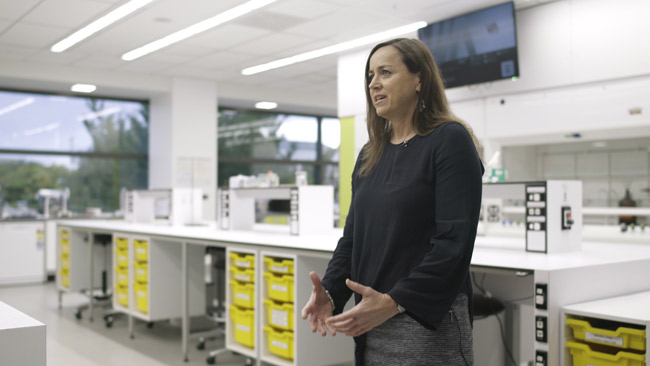Wednesday 2 May 2018 8:41pm

Physiology's Professor Alison Heather is one of three staff profiled in videos made as part of this year's Proof of Concept competition which closes on 14 May.
A series of videos, being released by Otago Innovation Ltd this week as part of its annual Proof of Concept competition, show that no pathway to investment is the same.
The 2018 Proof of Concept competition opened last month, and closes on Monday 14 May. It is searching for commercially prospective research ideas that could be transformed into a marketable idea, product or service, with the winner receiving $60,000 to help further validate their idea.
Jodie Ludwig from the Proof of Concept Management team, says the three videos, which have been emailed to academics, highlight relatable stories of Otago projects that are at different stages of securing investment.
Otago Innovation has released these videos to help potential applicants understand how their idea could impact on lives, benefit New Zealand’s economy and leave an enduring legacy.
“In the videos, their academic colleagues show that the process of commercialisation is exciting, rewarding and there is nothing to lose by trying,” Ms Ludwig says.
In the first video, Professor Alison Heather, an androgen biologist based in the University’s Department of Physiology, discusses a test she is developing to detect all anabolic steroids commonly used in sports doping.
“This is really exciting because we have started to use the test to screen for doped up race horses,” she says. “We’re still optimising the test, and I’m now working with race horse laboratories around the world to make the test into something they would want to use.”
She says Otago innovation Ltd is helping her develop a business around the test, organising the IP, and doing all of the other requirements necessary for investment.
And while she admits the project takes time away from her mainstream research and may have cost her a paper or two, she hopes the impact her science will make on the race horse industry will outweigh this.
“I don’t know where all this is going to end, but I’m really enjoying the journey.”
Dr Lyn Wise of Pharmacology and Toxicology has an equally inspiring project – a wound healing technology that could accelerate healing and limit scarring in patients following surgery. However, her story shows the path to getting investment is harder than she first thought.
“We have worked quite hard to get this product investment ready, from filing patents, through to engaging with clinicians and consultants and companies. We’ve developed manufacturing processes and extensive safety and efficacy testing plans,” she says in the video.
To take it to the next step – human proof of concept – they sought investment from the medical research commercialisation fund of Australia which is administrated by Brandon Capital.
“While we got fantastic feedback on the science and on the team, ultimately we weren’t successful in getting the funding we required to take this to the next step. And when it came down to it this was probably due to uncertainties in the state of the market and in the regulatory steps required.
“But, all is not lost, because engagement with Brandon Capital has actually opened up another product development opportunity, so watch this space,” she says.
Finally, Associate Professor Chris Pemberton of the University’s Christchurch campus discusses his success with a new technology he has developed to help rapidly diagnose a patient experiencing a heart attack or heart failure, and the company he has formed with help from Otago Innovation Ltd.
“Our technology was based around new markers, a particular set of peptides and proteins that were floating in the blood that no one had measured before.
“Otago Innovation came in and realised the value and intellectual potential and commercial potential of our work. And they performed the immediate steps with patent filing and protection of that and got it ready over a number of years for investors to come in which resulted in our exit strategy and formation of Upstream Medical Technologies.
“Without the support of Otago Innovation we could not have done any of that.”
The three videos follow on from three released during last year’s Proof of Concept competition which looked at how researchers could get the most “impact” from their idea. The latest videos focus on “how to get investor ready”.
“The researchers in this year’s videos are all relatable, real and remarkably modest,” Ms Ludwig says.
This year’s grant competition – what you need to know:
- The grant available is $60,000
- Applications close on Mon 14 May, 5pm
- A learn to pitch event will be held on Wed 23 May
- The competition is open to all the University’s academic staff. Postdoctoral fellows and PhD candidates can apply in conjunction with their supervisor or another academic staff member
- For more information, go to www.otagoinnovation.com
- The application form can be found at www.otago.ac.nz/proof-of-concept
